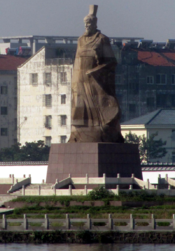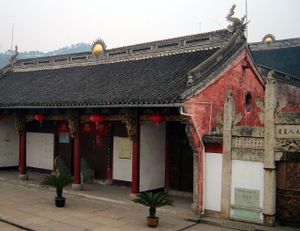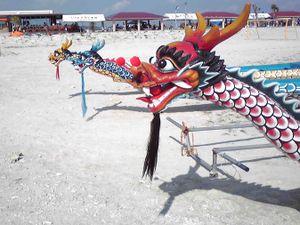مهرجان قوارب التنين
| 端午節 مهرجان قوارب التنين | |
|---|---|
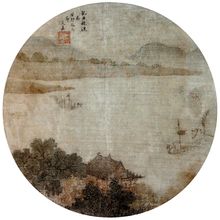 مهرجان قوارب التنين (القرن الثامن عشر) | |
| الاسم الرسمي | Dragon Boat Festival[1] (端午节) Dragon Boat Festival[2][3] (端午節) Tuen Ng Festival[4] (端午節) |
| يُحتفى به | الصينيون |
| النوع | ثقافي |
| الاحتفالات | Dragon boat racing, consumption of xionghuangjiu and zongzeh |
| التاريخ | اليوم الخامس من الشهر القمري الخامس |
| التكرار | سنوي |
| الارتباط | Children's Day, Dano, Tết Đoan Ngọ, Yukka Nu Hii |
مهرجان دوانوو Duanwu Festival، الذي كثيراً ما يُعرف، خصوصاً في الغرب، بإسم مهرجان قوارب التنين، هو عطلة تقليدية تنبع من الصين، وموعدها بالقرب من الانقلاب الصيفي. ويُعرف أيضاً بإسم مهرجان ژونگشياو (Chinese: 忠孝節; pinyin: Zhōngxiàojié)، ويحتفي بـ الولاء وتبجيل الوالدين. ويقع المهرجان الآن في اليوم الخامس من الشهر الخامس من التقويم الصيني التقليدي، الذي هو مصدر الاسم البديل للمهرجان، مهرجان الخمستين.[5] التقويم الصيني هو شمسي قمري، ولذلك فإن تاريخ المهرجان يتغير من عام لآخر في التقويم الگريگوري. وفي 2016، فقد وقع المهرجان يوم 9 يونيو؛ وفي 2017، فإنه في 30 مايو.
التاريخ
چو يوان
The story best known in modern China holds that the festival commemorates the death of the poet and minister چو يوان (ح. 340–278 BC) of the ancient state of تشو أثناء فترة الدويلات المتناحرة of the Zhou Dynasty.[6] A cadet member of the Chu royal house, Qu served in high offices. However, when the king decided to ally with the increasingly powerful state of Qin, Qu was banished for opposing the alliance and even accused of treason.[6] During his exile, Qu Yuan wrote a great deal of الشعر. Twenty-eight years later, Qin captured Ying, the Chu capital. In despair, Qu Yuan committed suicide by drowning himself in the Miluo River.
It is said that the local people, who admired him, raced out in their boats to save him, or at least retrieve his body. This is said to have been the origin of dragon boat races. When his body could not be found, they dropped balls of sticky rice into the river so that the fish would eat them instead of Qu Yuan's body. This is said to be the origin of zongzi.[6]
وو زيشو
Despite the modern popularity of the Qu Yuan origin theory, in the former territory of the state of وو, the festival commemorated Wu Zixu (died 484 BC). Wu Zixu was the Premier. Xishi, a beautiful woman sent from king Goujian of the state of Yue, was much loved by king Fuchai. Wu Zixu, seeing the dangerous plot of Goujian, warned king Fuchai, who became angry at this remark. Wu Zixu was forced to commit suicide by king Fuchai, with his body thrown into the river on the fifth day of the fifth month. After his death, in places such as Suzhou, Wu Zixu is remembered during the Duanwu Festival to this day.
Cao E
Although Wu Zixu is commemorated in southeast Jiangsu and Qu Yuan elsewhere in China, much of Northeastern Zhejiang including the cities of Shaoxing, Ningbo and Zhoushan celebrates the memory of the young girl Cao E (曹娥, AD 130–143) instead. Cao E's father Cao Xu (曹盱) was a shaman who presided over local ceremonies at Shangyu. In 143, while presiding over a ceremony commemorating Wu Zixu during the Duanwu Festival, Cao Xu accidentally fell into the Shun River. Cao E, in an act of filial piety, decided to find her father in the river, searching for 3 days trying to find him. After five days, she and her father were both found dead in the river from drowning. Eight years later, in 151, a temple was built in Shangyu dedicated to the memory of Cao E and her sacrifice for filial piety. The Shun River was renamed Cao'e River in her honour.[7]
عطلة سابقة الوجود
Modern research suggests that the stories of Qu Yuan or Wu Zixu were superimposed onto a pre-existing holiday tradition. The promotion of these stories might be encouraged by Confucian scholars, seeking to legitimize and strengthen their influence in China.
The stories of both Qu Yuan and Wu Zixu were recorded in Sima Qian's Shiji, completed 187 and 393 years after the events, respectively, because historians wanted to praise both characters.
Another theory, advanced by Wen Yiduo, is that the Dragon Boat Festival originated from dragon worship. Support is drawn from two key traditions of the festival: the tradition of dragon boat racing and zongzi. The food may have originally represented an offering to the dragon king, while dragon boat racing naturally reflects reverence for the dragon and the active yang energy associated with it. This was merged with the tradition of visiting friends and family on boats.
Another suggestion is that the festival celebrates a widespread feature of east Asian agrarian societies: the harvest of winter wheat. Offerings were regularly made to deities and spirits at such times: in the ancient Yue, dragon kings; in the ancient Chu, Qu Yuan; in the ancient Wu, Wu Zixu (as a river god); in ancient Korea, mountain gods (see Dano). As interactions between different regions increased, these similar festivals eventually merged into one holiday.
عطلة عامة
The festival was long marked as a cultural festival in China and is a public holiday in Hong Kong, Taiwan and Macau. The People's Republic of China government established in 1949, however, did not officially recognize Duanwu as a public holiday. Beginning in 2005, the government began to plan for the recognition of three traditional holidays, including Duanwu.[8] Since 2008, Duanwu has been celebrated not only as a festival but also as a public holiday in the People's Republic of China.[9] It is unofficially observed by the Chinese communities of Southeast Asia, including Singapore and Malaysia. Equivalent and related official festivals include the Japanese holiday of Children's Day (Japan).
الأنشطة
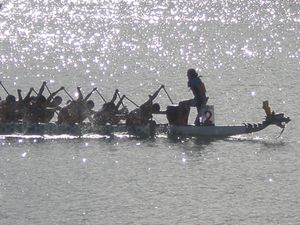
Three of the most widespread activities conducted during the Duanwu Festival are eating (and preparing) zongzi, drinking realgar wine, and racing dragon boats.[10]
Other common activities include hanging up icons of Zhong Kui (a mythic guardian figure), hanging mugwort and calamus, taking long walks, and wearing perfumed medicine bags. Other traditional activities include a game of making an egg stand at noon (this "game" implies that if someone succeeds in making the egg stand at exactly 12:00 noon, that person will receive luck for the next year), and writing spells. All of these activities, together with the drinking of realgar wine, were regarded by the ancients as effective in preventing disease or evil, while promoting health and well-being.
In the early years of the Republic of China, Duanwu was celebrated as the "Poets' Day" due to Qu Yuan's status as China's first known poet. The Taiwanese also sometimes conflate the spring practice of egg-balancing with Duanwu.[11]
The sun is considered to be at its strongest around the time of summer solstice, as the daylight in the northern hemisphere is the longest. The sun, like the Chinese dragon, traditionally represents masculine energy, whereas the moon, like the phoenix, traditionally represents feminine energy. The summer solstice is considered the annual peak of male energy while the winter solstice, the longest night of the year, represents the annual peak of feminine energy. The masculine image of the dragon was thus associated with the Dragon Boat Festival.[12]
انظر أيضاً
الهامش
- ^ Chinese Government's Official Web Portal. "Holidays Archived مايو 2, 2012 at the Wayback Machine". 2012. Accessed 1 November 2013.
- ^ خطأ استشهاد: وسم
<ref>غير صحيح؛ لا نص تم توفيره للمراجع المسماةroc - ^ خطأ استشهاد: وسم
<ref>غير صحيح؛ لا نص تم توفيره للمراجع المسماةmac - ^ GovHK. " General holidays for 2014". 2013. Accessed 1 November 2013.
- ^ "Double Fifth (Dragon Boat) Festival Archived مايو 6, 2008 at the Wayback Machine".
- ^ أ ب ت SCMP." Earthquake and floods make for muted festival. Retrieved on 2008-06-09. Archived يونيو 25, 2012 at the Wayback Machine
- ^ "The river in which she jumped was renamed as Cao's River".
{{cite news}}: Cite has empty unknown parameter:|dead-url=(help) - ^ People's Daily. "Peopledaily." China to revive traditional festivals to boost traditional culture. Retrieved on 2008-06-09.
- ^ Xinhua Net. "First day-off for China's Dragon Boat Festival helps revive tradition." Xinhua News Agency. Published 2008-06-08. Retrieved on 2008-06-09.
- ^ "Dragon Boat Festival". China Internet Information Center. Retrieved on 2013-06-12.
- ^ Huang, Ottavia. Hmmm, This Is What I Think: "Dragon Boat Festival: Time to Balance an Egg". 24 June 2012. Accessed 3 November 2013.
- ^ Chan, Arlene & al. Paddles Up! Dragon Boat Racing in Canada, p. 27. Dundurn Press Ltd., 2009. ISBN 978-1-55488-395-0. Accessed 1 June 2011.
وصلات خارجية
</noinclude>
- Articles containing صينية-language text
- Infobox holiday with missing field
- Infobox holiday (other)
- Articles containing برتغالية-language text
- Articles containing traditional Chinese-language text
- Observances set by the Chinese calendar
- Dragon boat racing
- Festivals in China
- التراث الثقافي غير الملموس للإنسانية
- Non-Gregorian May observances
- Non-Gregorian June observances
- Public holidays in China
- Boat festivals
